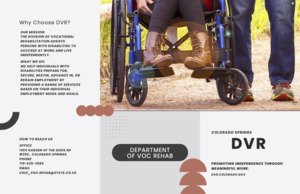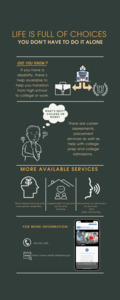Rehabilitation counseling is often poorly understood in the counseling field and the real world (Chun et al., 2025; M. T. Hartley & Tarvydas, 2022; Nerlich et al., 2021). Many individuals with disabilities and chronic illnesses are not aware of rehabilitation counseling services available to them, and other professionals serving these individuals are not aware of the types of services rehabilitation counselors and rehabilitation agencies provide. Even within the counseling community, there is a lack of understanding of the rehabilitation counselor’s scope of practice (Commission on Rehabilitation Counselor Certification [CRCC], n.d.). Given this lack of awareness and knowledge about rehabilitation counseling, rehabilitation counselors must engage in advocacy efforts to educate the public and other professionals about their role and the types of services they provide. To better prepare rehabilitation counselors-in-training to engage in advocacy efforts, a review of the available literature and an approach to teaching about advocacy is presented, along with an advocacy assignment for use in a course for rehabilitation counseling students. Examples of the advocacy assignments are also presented.
Review of Literature
Counseling and healthcare professionals are bound to ethical codes that prioritize the welfare of others and emphasize advocacy (Levine et al., 2024; Nerlich et al., 2021). The CRCC Code of Ethics (2023) establishes standards of practice for rehabilitation counselors, trainees, service recipients, educators, and researchers. The updated version of the code outlines the professional duty of rehabilitation counselors to recognize the intersection between disability and social justice, advocating for diversity, equity, and belonging (CRCC, 2023; Henry et al., 2023). Counseling associations must recognize how disability intersects with cultural identities and systems of oppression, as it is the job of rehabilitation counselors to advocate at all levels and acknowledge the interplay of disability issues like poverty, trauma, and addiction (T. H. Hartley & Saia, 2022; Kelsey & Smart, 2012).
Individuals with disabilities continue to face discrimination, often influenced by the complexities of disability identities (M. T. Hartley et al., 2015; Levine et al., 2024). The 2024 revised standards of The Council for Accreditation of Counseling and Related Education Programs (CACREP) emphasize social justice and address intersectionality as part of the foundational counseling curriculum (CACREP, 2024). However, there is a significant gap when it comes to teaching about the intersection of social justice and disability. Research shows that vocational rehabilitation services are often less accessible and practical for disabled individuals with overlapping minority identities. Racial and ethnic disparities persist in rehabilitation services, despite the existence of various legislative and policy initiatives (Levine et al., 2024; Yin et al., 2022). Additionally, health disparities for individuals with disabilities are linked to limited access to preventative healthcare and higher rates of adverse health behaviors (Nerlich et al., 2021). Rehabilitation counselors must understand the importance of advocacy in empowering their clients to advocate for the services they need.
Individuals with disabilities often lack access to necessary services. They also face controlling and condescending attitudes and continued microaggressions that reflect a lack of understanding and respect (T. H. Hartley & Saia, 2022; Levine et al., 2024). Even in mainstream rehabilitation counseling journals, topics related to social justice and diversity are often excluded (Levine et al., 2024). Rehabilitation counselors are uniquely positioned to work with individuals with disabilities. Rehabilitation counseling was initially based on legislation and disability rights, with strong ties to the disability advocacy community. However, this relationship has shifted, and rehabilitation counselors and educators face numerous challenges when undertaking this work. As a result, many are no longer advocating for full community inclusion for individuals with disabilities (Mitus & Levine, 2021).
Smith (2022) stated that discrimination is likely due to a limited understanding of disability rights and advocacy. Educating rehabilitation and mental health professionals about intersecting identities can help advance social justice, equity, and inclusion for members of the disability community (Smith, 2022). When counselors overlook a client’s social environment and do not recognize systemic oppression, it can contribute to discrimination and lead to misunderstandings about the challenges faced by marginalized individuals (Levine et al., 2024; Na & Fietzer, 2020). Education and training can significantly influence how rehabilitation counselors work with their clients; therefore, rehabilitation counselor educators must provide the necessary skills and insight to prevent harm (Killian & Floren, 2020; Levine et al., 2024). The goal is for rehabilitation counselors to carry a commitment to advocacy and inclusion throughout their professional journeys (Mitus & Levine, 2021).
The Commission on Rehabilitation Counselor Certification (2021) provides the following description of a rehabilitation counselor.
Rehabilitation counselors are the only professional counselors educated and trained at the graduate level specifically to serve individuals with disabilities. Through a comprehensive and unique counseling process, rehabilitation counselors help individuals who have disabilities set and achieve their personal, career, and independent living goals. They are the bridge between individual and self-sufficiency, helping them to live fully integrated lives. (para. 1)
CRCC conducted a job task analysis that defined 12 knowledge domains for rehabilitation counselors. Those domains are: professional orientation and ethical practice; counseling theories; techniques, and evidence-based practices; group and family counseling; crisis and trauma counseling interventions; medical and psychosocial aspects of chronic illness and disability; assessment/evaluation, occupational analysis, and service implementation; career development and job placement; business engagement; community resources and partnerships; case management; health care and disability management; research methodology and performance management.
Rehabilitation counselors can work in a variety of settings with a multitude of clients who have various types of disabilities. Settings include state vocational rehabilitation agencies, community rehabilitation partners, hospitals, rehabilitation centers, mental health facilities, public and private schools, universities and colleges, postsecondary education programs, Veteran’s Affairs, Social Security Administration, insurance companies, Worker’s Compensation, and private practice. These different settings require specialized skills that are unique to rehabilitation counselors, setting them apart from their counterparts in mental health counseling, social work, or psychology. Despite this unique skillset and the multitude of work settings, rehabilitation counseling remains a lesser-known counseling specialty.
Discussion
As a tangible way to develop skills and encourage increased visibility of the rehabilitation counseling profession, two components were used to train and engage students in professional advocacy efforts. The first was a lecture about the history of advocacy in the field of disability rights and rehabilitation, and the second was an advocacy assignment students completed individually or in small groups.
Advocacy Lecture
To set the tone that advocacy is infused throughout the work of rehabilitation counselors, the advocacy lecture was the first lecture of the semester. The lecture began with a definition of advocacy from Merriam-Webster (2025), “the act or process of supporting a cause or proposal; the act or process of advocating something.” The lecture covered the history of advocacy in rehabilitation counseling, starting in 1970 with Judy Heumann and her advocacy efforts to obtain her teaching license through Heumann vs The Board of Education (Heumann & Joiner, 2020). Then, we discussed Ed Roberts and founding the first Center for Independent Living. After examining these two pioneers, we explored community advocacy movements such as the 504 sit-ins in 1977 and the Deaf President Now protests at Gallaudet University in 1988. Finally, we discussed the work involved in passing the Americans with Disabilities Act (ADA) in 1990.
Following these historical advocacy efforts by people with disabilities, we moved into contemporary advocacy movements, such as the Spread the Word to End the Word campaign in 2007 to raise awareness and end the use of the word “retarded” (Spread the Word, 2019) and the What Can You Do? Campaign for Disability Employment funded by the United States Department of Labor’s Office for Disability Employment. This latter campaign featured multiple public service announcements (PSAs) designed to promote positive employment outcomes for disabled individuals. Following the coverage of these contemporary movements, the lecture featured videos from two speakers addressing the importance of advocacy for rehabilitation counselors and their own experiences with advocacy. The instructor shared her own experiences with personal and professional advocacy, such as participating in Rare Disease Day on Capitol Hill. Students were encouraged to share their personal or professional experiences with advocacy. At the conclusion, the instructor presented the advocacy project assignment and instructions.
Advocacy Assignment
The following instructions were provided to students: "To remedy the lack of awareness about rehabilitation counseling, for this assignment, students will create a Public Service Announcement (PSA) or Advocacy/Outreach Campaign to raise awareness of Rehabilitation Counseling Services to healthcare providers, service providers, individuals who could benefit from Rehabilitation Counseling Services, transition-age youth, and/or the general public. This PSA or Campaign can take a variety of formats, including:
-
YouTube, TikTok, or Facebook video
-
Fliers, handouts, or pamphlets for mental health counseling offices, various specialty service provider offices, career counseling offices, school counseling offices, and social work offices
-
Information booths at a community resource fair, professional organization conference, or school career fair
-
Presentation for visiting special education and/or general education classrooms, professional organization conferences, veterans’ groups, etc.
-
Video spotlight designed for local news stations.
-
Audio, video, or popup/banner advertisement for local news stations, radio, Spotify, Pandora, etc.
-
Social media advertisement
-
Bus, subway, or billboard advertisement
-
Twitter/X campaign
-
Any other format of public visibility you deem fulfills assignment objectives (with instructor approval).
Students may work independently or in groups of 2 or 3 to complete this project."
Students in the on-campus section presented their projects in person on the last day of class. The students in the online section were asked to upload their projects to a discussion board and then review at least one other project.
Advocacy Assignment Examples
The following examples illustrate completed student projects. Figure 1 is a trifold brochure about Colorado’s Division of Vocational Rehabilitation. Advocacy efforts are seen in showcasing the mission of DVR and helping individuals with disabilities in employment. Figure 2 is a flyer about Alabama Rehabilitation Services. It highlights the advocacy efforts of ADRS around the services offered for individuals with disabilities.
Implications
Rehabilitation counselors have an ethical imperative and obligation to engage in advocacy. Section C of the CRCC (2023) Code of Ethics is titled Advocacy and Accessibility. Therefore, we should start laying the foundation for professional advocacy efforts in training programs at the master’s level. Students are often educated about advocacy efforts and their importance but are not always allowed to engage in these efforts during their program. Allowing students to practice their advocacy skills in a safe environment and encourage success may make them more likely to engage in advocacy efforts as practicing professionals.
Lessons Learned
Students in the four classes where I used this assignment found the experience worthwhile. The lecture was relevant, and the assignment increased their advocacy knowledge. They reported enjoying the assignment and the chance to be creative in the creation and delivery of their PSA. The next time I use this assignment, I intend to add a second component. Rather than presenting their work only to their classmates, I will have student groups partner with a real vocational rehabilitation agency or community-based rehabilitation provider and design a PSA for that specific agency, perhaps even conducting a needs assessment around publicity and advocacy, getting to know what the agency is already doing for advocacy and addressing any gaps in their marketing and outreach. I would ask the agency review and then implement the PSA in real life, assessing if it helped raise awareness and bring consumers to their agency. This would tie in program evaluation and efficacy, and like increase student engagement if there is a tangible component to it.
Conclusion
This article provides information and guidance on an advocacy project for rehabilitation counselors-in-training. Before creating the project, students are taught about the history of advocacy in rehabilitation counseling. The project requires students to develop a public service announcement advertising rehabilitation counseling services to a specific population. By completing this project, students learn to fulfill the ethical imperative to engage in advocacy efforts outlined in the Code of Ethics for certified rehabilitation counselors.



